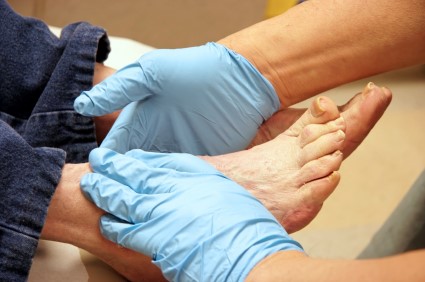 A study conducted by the Gustave Dron Hospital in France suggests that a shorter period of antibiotic treatment may be more effective in patients with diabetic foot osteomyelitis than other forms of treatment. The study was conducted using 40 patients that were given oral antibiotics for the disease between 2007 and 2009 from five French hospitals. According to the Infectious Diseases Society of America guidelines, diabetic foot osteomyelitis should be resolved within three months of antibiotic therapy. However, the study showed nearly two-thirds of the patients had achieved remission in about six to twelve weeks of treatment. This proves that a shorter time span of treatment and nonsurgical treatment are acceptable methods for certain patients with osteomyelitis.
A study conducted by the Gustave Dron Hospital in France suggests that a shorter period of antibiotic treatment may be more effective in patients with diabetic foot osteomyelitis than other forms of treatment. The study was conducted using 40 patients that were given oral antibiotics for the disease between 2007 and 2009 from five French hospitals. According to the Infectious Diseases Society of America guidelines, diabetic foot osteomyelitis should be resolved within three months of antibiotic therapy. However, the study showed nearly two-thirds of the patients had achieved remission in about six to twelve weeks of treatment. This proves that a shorter time span of treatment and nonsurgical treatment are acceptable methods for certain patients with osteomyelitis.
Diabetes is a very serious condition that can result in many complications if left untreated. If you are diabetic and have any concerns, visit Dr. Joshua David Scoll of Pennsylvania. Dr. Scoll can treat your diabetic feet.
Diabetic Foot Care
Diabetes affects millions of people of all ages each year. Diabetes damages blood vessels in many parts of the body, including the feet. When damage occurs to nerves in the feet, they may be unable to send the proper signals to the peripheral nervous system, resulting in a condition known as neuropathy. Once a diabetic patient develops neuropathy, it is imperative that the feet are well taken care of to avoid possible amputation of the feet.
The Importance of Caring for Your Feet
- Regularly check your feet for bruises or sores.
- Wear socks that fit your feet; socks shouldn’t be tight.
- Wear properly fitting shoes that are comfortable.
Patients with diabetes should have their doctor monitor their Hemoglobin A1C levels as this test lets the physician know how well the blood sugar levels have been controlled during the past 3 months. It is important to keep the blood sugar levels in a normal range (70-110mg/dl). It is advisable to visit a podiatrist if the diabetic patient is experiencing any conditions involving the feet.
For more information about Diabetic Foot Care, follow the link below.
If you have any questions feel free to contact one of our offices located in in Philadelphia and Bensalem, PA. We offer the latest in diagnostic and treatment technology to meet your needs.
Read more about Diabetic Foot Care
